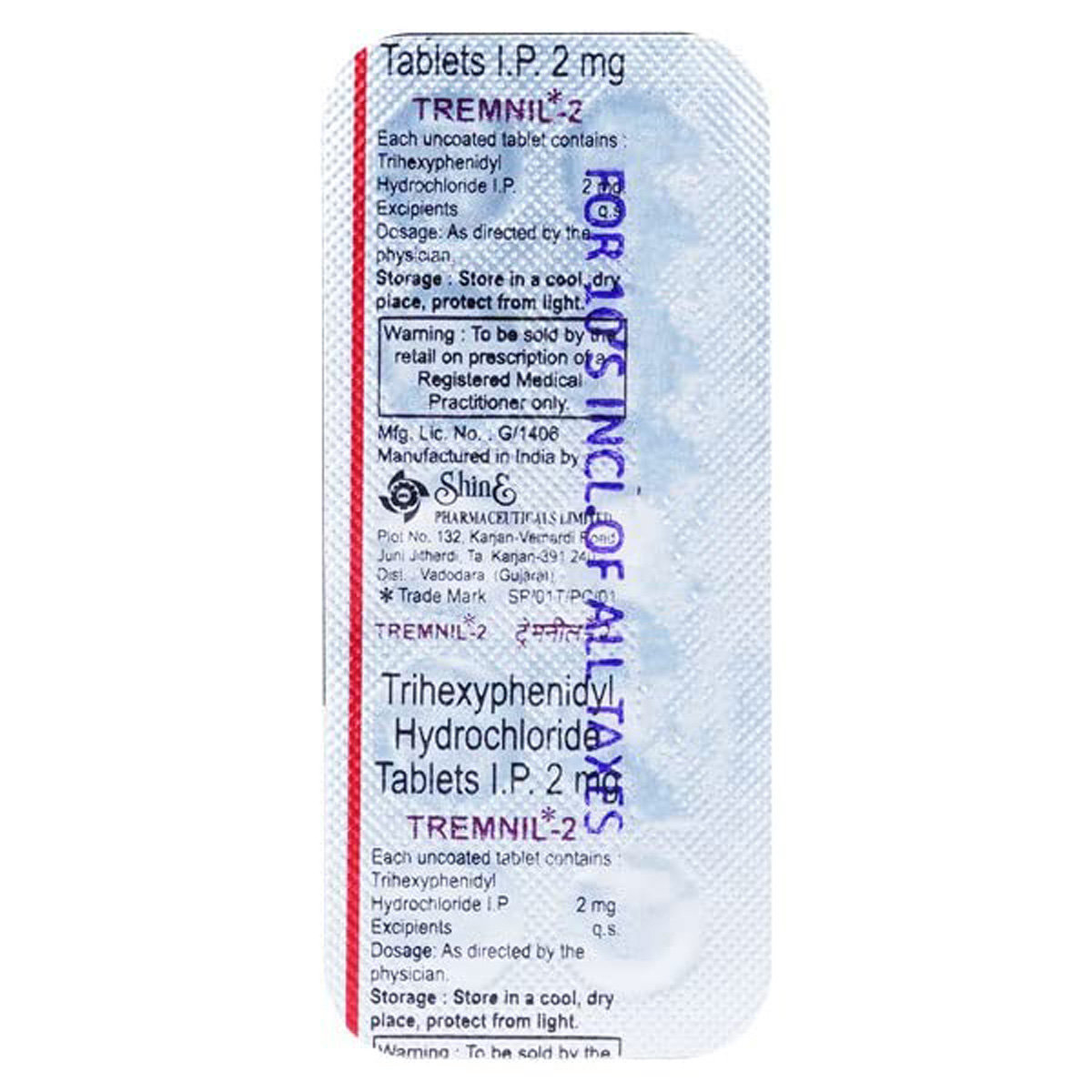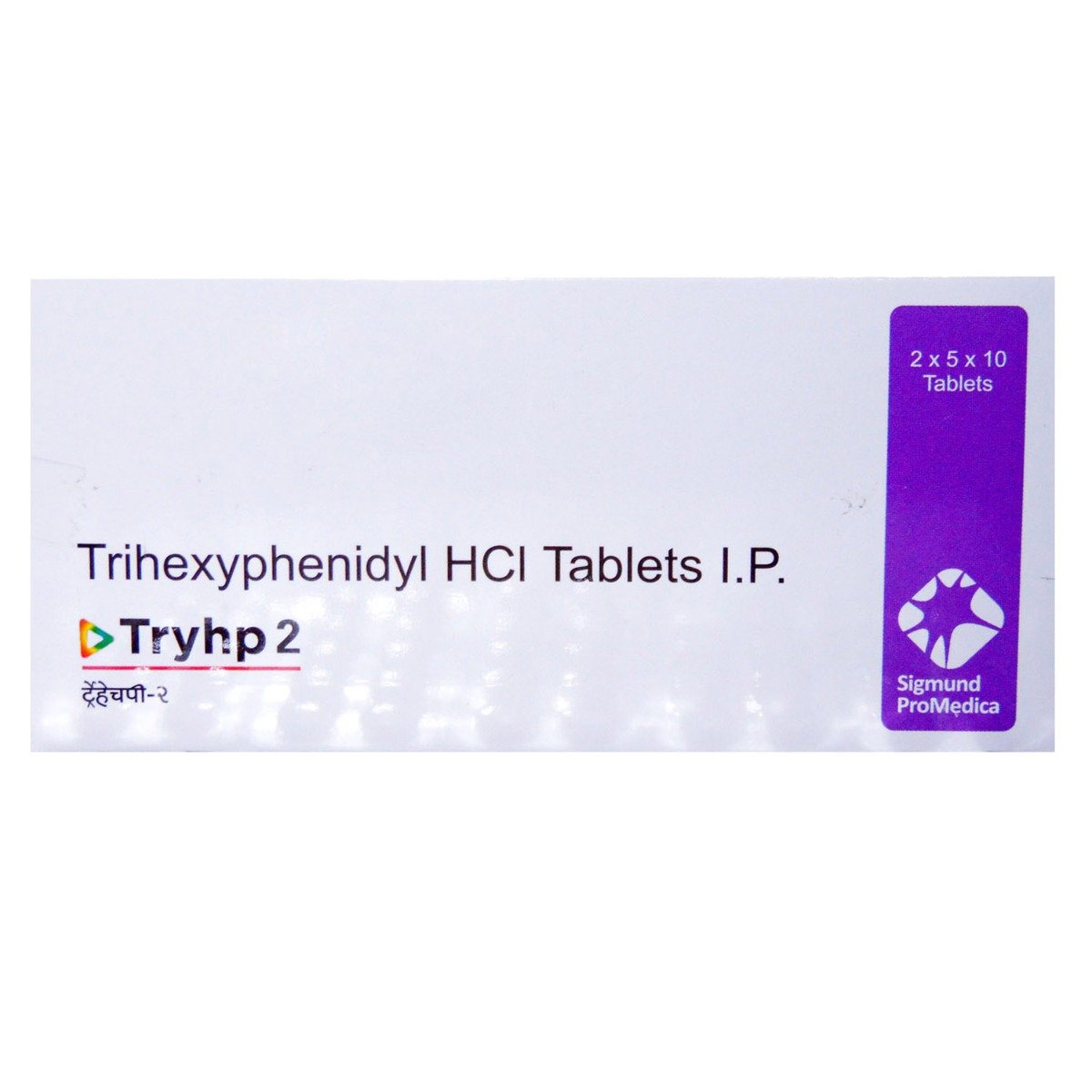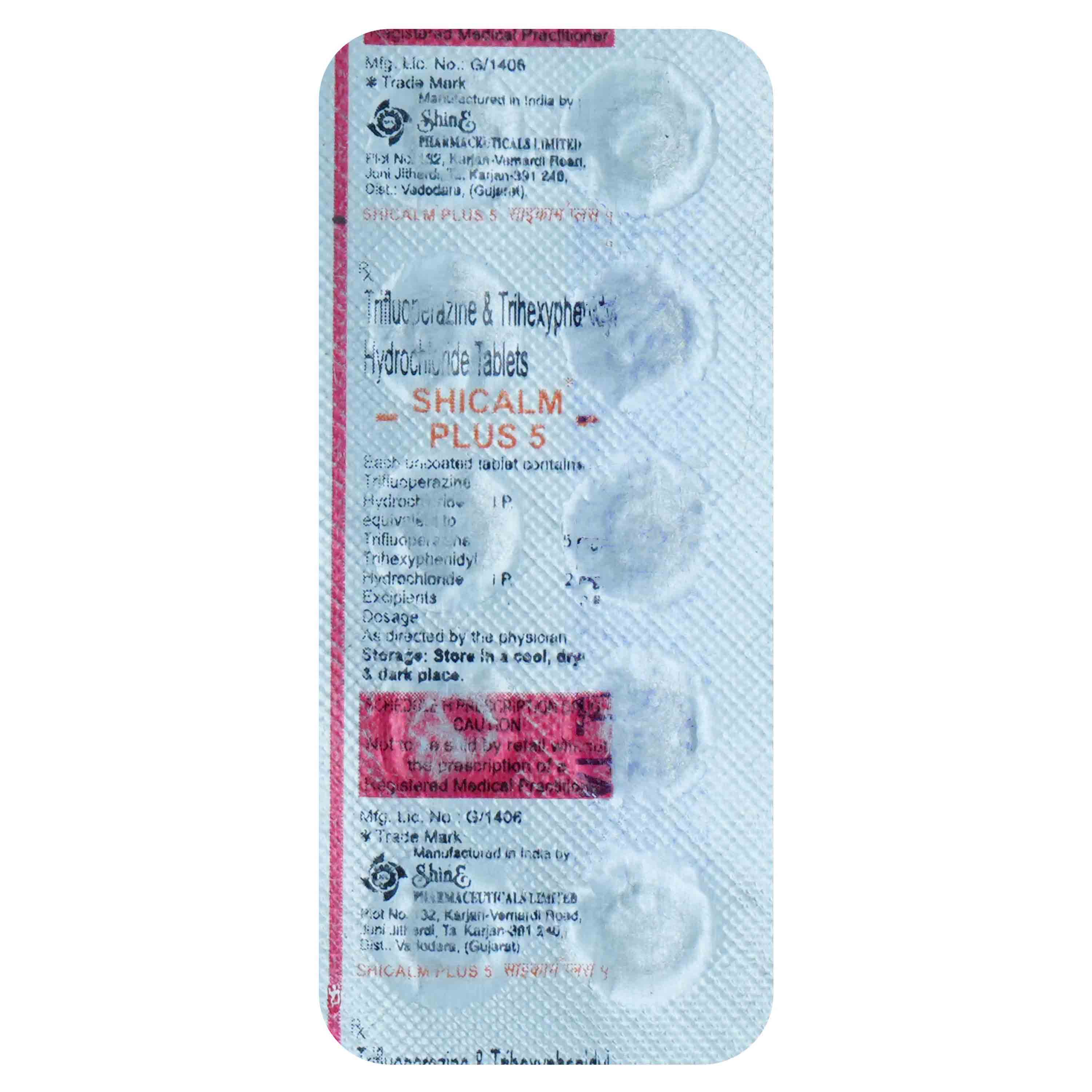Trihexiphenidyl
About Trihexiphenidyl
Trihexiphenidyl is used to treat Parkinson’s disease. Parkinson’s disease is a disorder of the central nervous system that affects movement and locomotion. It causes stiffness, shaking, difficulty in walking, coordination, and balance.
Trihexiphenidyl belongs to the class of medicines known as anticholinergics, which inhibit the effects of acetylcholine. In this way, it decreases sweating, overexcited muscle functioning, and saliva production and improves walking ability in persons with Parkinson's disease.
Take Trihexiphenidyl as prescribed by your doctor. You are advised to take Trihexiphenidyl as long as your doctor has prescribed it for you, depending on your medical condition. In some cases, you may experience certain common side effects, such as nervousness, dizziness, constipation, flushing, nausea, upset stomach, and headache. You are advised to talk to your doctor if you experience these undesirable effects persistently.
If you are known to be allergic to Trihexiphenidyl or any other medicines, please tell your doctor. If you are pregnant or breastfeeding, it is advised to inform your doctor. If you have glaucoma, an enlarged prostate, urination problems, a bowel obstruction, epilepsy or other seizure disorder, heart problems, coronary artery disease, high blood pressure, alcoholism, a problem with your nerves, brain, or spinal cord, involuntary muscle movements, intense urges like gambling, spending money, overeating or increased sexual urges, please consult with your doctor before taking Trihexiphenidyl.
Uses of Trihexiphenidyl
Medicinal Benefits
Trihexiphenidyl is an antiparkinson agent that is used in the treatment of Parkinson’s disease. This medicine is also used to treat and prevent symptoms like severe muscle spasms of the back, neck, and eyes caused by medicines used for treating delusions, hallucinations, paranoia, or disordered thoughts. Trihexiphenidyl belongs to the class of medicines known as anticholinergics, which acts by restraining the effects of acetylcholine. In this way, it decreases sweating, over-excited muscle functioning, and saliva production and improves walking ability in persons with Parkinson's disease. Thereby, it improves the symptoms of Parkinson’s disease.
Directions for Use
- Trihexiphenidyl should be taken with food as advised by a doctor.
- Trihexiphenidyl is typically taken three or four times a day, at the same time for best results; however, follow your doctor's instructions regarding the dosage and timing.
- Swallow Trihexiphenidyl as a whole with a glass of water.
- Do not crush, chew, or break it.
Storage
Side Effects of Trihexiphenidyl
- Nervousness
- Dizziness
- Constipation
- Flushing
- Nausea
- Upset stomach
- Headache
Medicines Containing this Salt
View AllDrug Warnings
Before taking Trihexiphenidyl, inform your doctor if you are allergic to it or any other allergies. This product may contain inactive ingredients, which can cause allergic reactions or other problems. . Trihexiphenidyl is not safe in pregnancy because it causes miscarriage and abnormalities in the fetus. Trihexiphenidyl is not allowed to take Trihexiphenidyl as it may pass into breast milk and affect the nursing baby. It is better to consult your doctor to know the risks and benefits associated with Trihexiphenidyl. Tell your doctor if you are dealing with medical conditions like glaucoma, an enlarged prostate, urination problems, a bowel obstruction, severe constipation, epilepsy or other seizure disorders, heart problems, coronary artery disease (clogged arteries), high blood pressure, alcoholism, a problem with your nerves, brain, or spinal cord. After checking your health condition, the doctor will decide if Trihexiphenidyl is safe for you or not. Avoid doing exercise in hot weather as it can make you overheated or dehydrated. Trihexiphenidyl can reduce sweating and increase the risk of heatstroke. With it, avoid consuming cannabis, CBD, or marijuana, as it may increase the side effects of this medicine.
Drug Interactions
Drug-Drug Interactions: Trihexiphenidyl may interact with antidepressants (amitriptyline), medications used to treat mental illness (chlorpromazine, thioridazine, clozapine), certain antiarrhythmics (disopyramide, quinidine), anticholinergics/antispasmodics (belladonna alkaloids), MAO inhibitors (isocarboxazid, linezolid, moclobemide, phenelzine, procarbazine, safinamide, tranylcypromine), corticosteroids (prednisone), motion sickness medication (meclizine), potassium tablets/capsules, tricyclic antidepressants (amitriptyline).
Drug-Food Interactions: Trihexiphenidyl may interact with alcohol and cause serious addiction effects, so one should not consume alcohol.
Drug-Disease Interactions: The use of the name is restricted in medical conditions, including narrow-angle glaucoma, diabetics, epilepsy, prolonged or painful erection, kidney problems, liver problems, and high level of the hormone prolactin in your blood or if you have a tumour, dementia caused by stroke.
Drug-Drug Interactions Checker List:
Safety Advice

Alcohol
unsafeIt is unsafe to consume alcohol since alcohol consumption with Trihexiphenidyl may increase the risk of dizziness, fainting, or headache.

Pregnancy
unsafeTrihexiphenidyl is not safe in pregnancy because it causes miscarriage and abnormalities in the fetus. It is better to consult your doctor to know the risks and benefits associated with Trihexiphenidyl.

Breast Feeding
unsafeTrihexiphenidyl is not allowed to be taken by a breastfeeding mother as it may pass into breast milk and affect the nursing baby. It is better to consult your doctor to learn the risks and benefits associated with Trihexiphenidyl.

Driving
cautionTrihexiphenidyl is not safe during the drive because it can make you feel drowsy. So, it would be best not to do anything that requires concentration and attention.

Liver
cautionTrihexiphenidyl to be taken with caution, especially if you have a history of liver diseases. Your doctor may adjust the dose based on your medical condition.

Kidney
cautionTrihexiphenidyl should be taken with caution, especially if you have a history of kidney diseases. Your doctor may adjust the dose based on your medical condition.

Children
safe if prescribedTrihexiphenidyl can only be advised to children if prescribed by a doctor.
Habit Forming
Diet & Lifestyle Advise
- Eat more fibre-rich foods to ease constipation.
- Avoid consumption of alcohol as it may increase drowsiness.
- Drink plenty of water to avoid headaches due to dehydration.
- Use caution while driving or doing anything that requires concentration, as Trihexiphenidyl can cause dizziness and sleepiness.
- Avoid consuming alcohol while taking this medication, as it may lower its benefits. It can cause dry mouth. Maintain good oral fluid, chew without sugar gum, or suck on hard candy for the dry mouth.
- Avoid high-protein foods like soy protein, fish, eggs, chicken, beef, and pork. Eat more whole-grain foods such as whole-wheat bread, oatmeal, brown rice, or pasta.
Special Advise
- DaTscan is a technique that allows doctors to see detailed pictures of the brain's dopamine system in Parkinson's patients.
- Your doctor may advise regular monitoring of intraocular pressure while taking this medicine, as an increase in eye pressure may cause blurry vision.
Patients Concern
Disease/Condition Glossary
Parkinson’s disease is a progressive disorder of the central nervous system that affects nerve cells in the brain that are responsible for producing dopamine. When this happens, dopamine levels start reducing. A person starts noticing stiffness, tremors in one hand, slow movements, shaking, difficulty walking, coordination, stooped posture, and voice changes. This condition can last for many years or a lifetime. Treatment with medicines and physiotherapy may help control the symptoms and provide a quality life for as long as possible.
FAQs
Trihexiphenidyl belongs to the class of medications called antiparkinson agents, indicated in the treatment of Parkinson's disease.
Avoid doing exercise in hot weather as it can make you overheated or dehydrated. Trihexiphenidyl can reduce sweating and increase the risk of heatstroke.
Tell your doctor if you are dealing with medical conditions like glaucoma, an enlarged prostate, urination problems, a bowel obstruction, severe constipation, epilepsy or other seizure disorders, heart problems, coronary artery disease (clogged arteries), high blood pressure, alcoholism, a problem with your nerves, brain, or spinal cord. After checking your health condition, the doctor will decide if Trihexiphenidyl is safe for you or not.
It has been reported that Trihexiphenidyl is not suitable for patients with narrow-angle glaucoma (damage to the optic nerve that is essential for good vision) as it may increase fluid pressure inside the eye. However, regular monitoring of eye pressure is recommended while on treatment with Trihexiphenidyl. Consult a doctor for further advice.
It is advised not to stop taking Trihexiphenidyl without consulting your doctor, as it may make the condition worse. Therefore, take Trihexiphenidyl for as long as your doctor has prescribed it, and if you notice any improvement in your situation, please consult your doctor so that the dose may be adjusted.
Parkinson's disease is a gradually progressing lifelong disease that is chronic and gets worse with time. With the right medicine, only the symptoms of Parkinson's disease can be managed.
Trihexiphenidyl is typically taken three or four times a day, either with or without food. For best results, take it at the same time each day. However, always take Trihexiphenidyl as per dose and duration advised by your doctor.
Before taking Trihexiphenidyl, inform your healthcare expert if you have any heart, liver, kidney, high blood pressure, stomach, bowel, bladder, or prostate issues, or a history of tardive dyskinesia (TD). Also, mention any other medications, supplements, or herbal products you are using to avoid potential interactions. If you are pregnant or breastfeeding, discuss potential risks with your doctor.
Take Trihexiphenidyl as directed by your doctor. Swallow Trihexiphenidyl whole with a glass of water; do not crush, chew, or break it.
No, Trihexiphenidyl is not a narcotic. It does not have any habit-forming potential. So, you may not get high after taking Trihexiphenidyl. However, its ability to cause hallucinations (illusions) and feelings of euphoria (feeling of excitement) may lead some people to misuse it. Therefore, do not take Trihexiphenidyl unless advised by a doctor.
Trihexiphenidyl may make drowsy in some people, but it is not known how often drowsiness occurs. Avoid driving or operating heavy machinery if you feel drowsy.
If you have taken more than the recommended doses of Trihexiphenidyl, seek medical help right away. Symptoms of an overdose may include dry mouth, blurred vision, and confusion. Be sure to bring the medicine bottle with you, even if it's empty.
You are not recommended to crush Trihexiphenidyl as it may lose effectiveness or cause side effects when altered. Therefore, consult a doctor before taking Trihexiphenidyl as they can advise you on whether it's safe to crush the tablet.
You can take Trihexiphenidyl with food or without food or just after the meal as advised by your doctor at regular doses.
You are recommended to use Trihexiphenidyl for as long as it is advised by your doctor for effective results. If your symptoms continue or worsen, seek further advice from your doctor.
Weight gain is not typically associated with Trihexiphenidyl. However, some individuals may experience changes in appetite or other side effects. Consult your doctor, if you have any concerns.
Trihexiphenidyl may cause side effects such as nausea, vomiting, dizziness, constipation, weakness, headache, dry mouth, decreased urination, and drowsiness. However, these will reduce over time. Please consult a doctor if these side effects persists longer.






